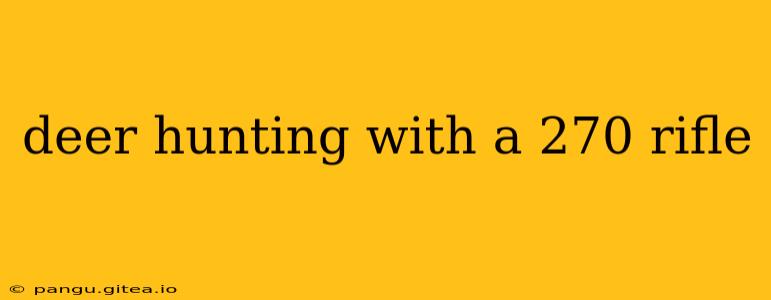The .270 Winchester is a legendary cartridge, renowned for its accuracy, power, and versatility, making it a popular choice for deer hunting. This guide will delve into the specifics of using a .270 for deer hunting, covering everything from choosing the right ammunition to ethical hunting practices.
Choosing the Right .270 Ammo for Deer Hunting
Selecting the correct ammunition is crucial for a successful and ethical hunt. While the .270 boasts impressive stopping power, choosing the wrong bullet can lead to poor shot placement and wounded animals. Consider these factors:
-
Bullet Weight: Bullet weights typically range from 130 grains to 150 grains. Heavier bullets offer more energy and penetration, particularly beneficial for larger deer or longer shots. Lighter bullets offer flatter trajectories, ideal for shots within closer ranges.
-
Bullet Type: Several bullet types cater to different hunting styles and preferences.
- Full Metal Jacket (FMJ): Not recommended for hunting, primarily used for target practice.
- Soft Point (SP): Expand reliably upon impact, delivering significant energy transfer. A good all-around choice.
- Ballistic Tip (BT): Designed for long-range accuracy and rapid expansion, offering high energy transfer.
- Controlled Expansion: These bullets maintain better weight retention than some other expanding bullets, ensuring deeper penetration.
-
Manufacturer Reputation: Opt for reputable ammunition manufacturers known for consistent quality and performance.
Understanding Ballistics and Effective Range
Knowing your .270's ballistics is paramount. Factors like bullet weight, twist rate of your rifle barrel, and atmospheric conditions (temperature, humidity, wind) all impact bullet trajectory and energy retention. Understanding these factors allows you to accurately judge distances and make ethical shots. Use a ballistics calculator specific to your chosen ammunition to determine your effective range – this is the range within which you can confidently make a humane kill shot. Never shoot beyond your effective range.
Zeroing Your Rifle
Properly zeroing your rifle is crucial for accurate shot placement. This involves adjusting your scope's sights to ensure your bullet impacts the target where your crosshairs are aimed at a specific distance (typically 100 or 200 yards). Professional assistance from a gunsmith or experienced hunter is recommended for first-time zeroing.
Ethical Hunting Practices with a .270
Ethical hunting is paramount. It encompasses respect for the animal, the environment, and the hunting tradition. Key considerations include:
- Shot Placement: Aim for vital areas such as the heart and lungs. A well-placed shot ensures a quick and humane kill.
- Tracking Wounded Animals: If you miss your initial shot, carefully track the animal. If the trail indicates a significant wound, contact a game warden or experienced hunter to assist with the recovery. Never give up on a wounded animal, but prioritize safety.
- Following Regulations: Always comply with all hunting regulations, licensing requirements, and game laws in your area.
Gear and Preparation for a Successful Hunt
Beyond the rifle and ammunition, appropriate gear and preparation are essential for a safe and successful deer hunting experience. This includes:
- Optics: A quality scope suitable for your rifle and hunting conditions is crucial for accurate shot placement.
- Clothing: Dress appropriately for the weather and terrain. Camouflage clothing can improve your concealment.
- Safety Gear: Always wear appropriate safety gear, including eye protection and hearing protection.
- First-Aid Kit: Carry a comprehensive first-aid kit to handle minor injuries.
Conclusion
The .270 Winchester is a powerful and versatile cartridge well-suited for deer hunting. However, responsible gun handling, understanding ballistics, ethical hunting practices, and thorough preparation are crucial for a successful and ethical hunt. Remember to always prioritize safety and respect for the animal and the environment.
